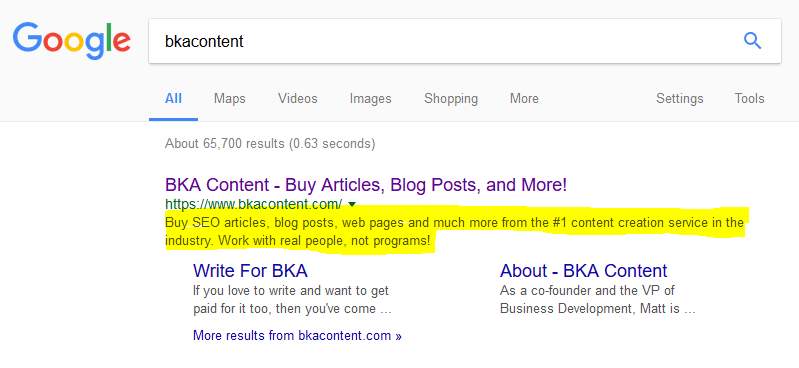
Google Raises Meta Descriptions From 160 to 320 Characters


Here is an example of a description snippet highlighted:

What Was Changed?
Google’s search snippets have been extended to show up to a maximum of 320 characters. The previous maximum character count was 160 characters.
A Google spokesperson recently told Search Engine Land:
“We recently made a change to provide more descriptive and useful snippets, to help people better understand how pages are relevant to their searches. This resulted in snippets becoming slightly longer, on average.”
Should You Update All Of Your Old Meta Descriptions?
It depends.
It’s important to note that Google still takes the liberty of how many characters they will show in the 160 and 320 character range. In fact, Google may or may not show your meta description, but may instead pull other information from the page to show in the snippet that they deem is more relevant.
To cut to the point, if you feel like your existing meta description clearly explains what your page is about, there is no need to change it. However, if you feel that a meta description could be rewritten to provide more clarity to a user, fix it.
“There’s no need for publishers to suddenly expand their meta description tags, if they feel their current ones are adequate. … We now display slightly longer snippets, which means we might display more of a meta description tag.” – Google
Should You Make All New Meta Descriptions 320 Characters?
It certainly doesn’t hurt. The reason being is that Google has confirmed that they try to create the snippet from your provided meta descriptions first. If they feel that it isn’t beefy enough, they add to it or show something else altogether. So why not provide a longer, more descriptive meta in the first place?
John Mueller from Google gave some insight in a recent Google Hangout:
“So in general what one of the things we’ve been experimenting with [is] showing longer descriptions in the search results and I believe that’s something that more and more people are seeing.
So for the descriptions that we show we try to focus on the meta description that you provide on your pages but if we need more information or more context based on the user’s query perhaps then we can take some parts of the page as well. Essentially from from a purely technical point of view these descriptions aren’t a ranking for anything. So it’s not the case that changing your descriptions or making them longer or shorter or tweaking them or putting keywords in there will affect your site’s ranking. However it can affect the way that users see your site in the search results and whether or not they actually click through to your site. So that’s kind of one one aspect there to keep in mind.
And with that aspect sometimes it does make sense to make sure that the description that you’re providing to search engines, that’s perhaps being shown to users when they search for normal things on your website. That description is something that explains what your service is where your page offers, maybe the unique proposition that you have on your page. That kind of encourage[s] people to click through to your page that probably makes sense for a lot of cases. And sometimes it makes sense to say well I know how to describe this best, therefore I’ll write it up in the description and if Google can show this then my hope that people will see my site is being clearly superior to all other ones and click on my site rather than some of the other ones that are ranking in the same search results page.
So with that in mind. It’s not a ranking factor. It can affect how your site is visible in the search results. So with that I definitely see it as something legitimate where you might say well I want to make sure that my my kind of proposition is out there in full and therefore I’ll try to write something a bit longer and show that in my meta description.”
Based on this explanation, you might as well create larger, more descriptive meta descriptions that near the 320 limit in order to help with visibility and user engagement. After all, it can’t hurt you from a ranking perspective but can only help a user decide to check out your page!
Need help creating meta descriptions that can utilize this newly updated character range? Check out our meta description writing services.
- The Google Quick Answer Box: What, Why and How? - December 20, 2023
- Top 10 Link-Building Strategies for Content Marketers - July 12, 2023
- 8 Types of Ecommerce Content You Should Start Using - May 15, 2023

